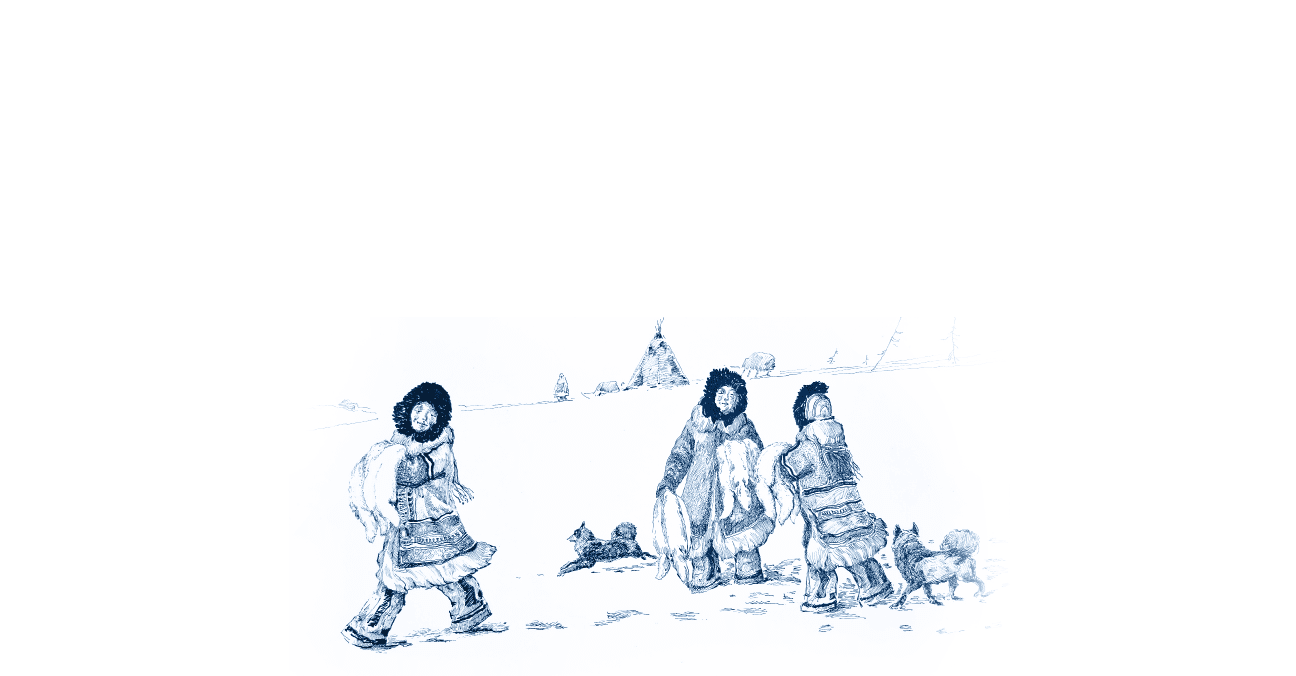Indigenous peoples and human rights
CHRB A.1.3.a.EX; D.3.5Strategic goals:
minimise the Company’s impact on local communities
support the interests of indigenous northern minorities
foster sustainable social and economic development across the Company’s footprint
contribute to the well‑being of society at large nationally and internationally
Nornickel respects the rights of indigenous peoples. The Company respects and exercises the right of indigenous peoples to a Free, Prior and Informed Consent (FPIC), creates platforms for an equal dialogue involving representatives of both indigenous peoples and the Company, including the Group’s management, and implements sustainable development projects for indigenous peoples with a view to supporting the economy based on the traditional use of natural resources, improving rural ways of living, and fostering indigenous traditions and culture.
In 2021, Nornickel established a Coordinating Council for Interacting with Family (Tribal) Communities of Indigenous Northern Minorities supervised by the Company’s Senior Vice President, Head of Norilsk Division. The Council brings together 57 tribal communities engaged in traditional economic activities on the Taimyr Peninsula.
Programme to support indigenous peoples
Since 2020, Nornickel has been implementing one of its largest programmes in terms of financing to support and promote indigenous peoples, with over RUB 2 bn earmarked for five years. In 2021–2023, the Coordinating Council for Interacting with Family (Tribal) Communities of Indigenous Northern Minorities assigned an additional RUB 300 mln (RUB 100 mln annually) to support indigenous peoples and foster their traditional economic activities.
The Company covers expenses to transport agricultural products (reindeer meat, northern species of fish) from settlements and hunting/fishing facilities located in the Taimyrsky Dolgano‑Nenetsky Municipal District (cities of Dudinka and Norilsk) to retail chains for further resale. Nornickel also supported a research to assess the water bioresources of the Yenisey and Khatanga rivers with a view to raising indigenous peoples’ quotas.
2023 saw seven houses built and three first aid and obstetric facilities commissioned in Volochanka, Ust‑Avam and Ust‑Port. We also purchased five apartments in Dudinka for orphaned children.
Ongoing relocation of indigenous peoples in Tukhard
Nornickel was the first company in the Russian Arctic to obtain FPIC for launching the Tukhard relocation and development programme in line with the standard of responsibility of residents in the Arctic zone of the Russian Federation and international requirements (the UN Declaration on the Rights of Indigenous Peoples, International Financial Corporation’s Performance Standard 5 (Resettlement) and Performance Standard 7 (Indigenous Peoples)).
Following five months of the FPIC negotiations and three rounds of consultations, the residents of Tukhard consented to relocation, identified development priorities, chose the site for their new settlement, elected the Council of Representatives, and defined the terms of interaction with the Company in the design and construction process.
The agreement also caters to the needs of reindeer herders living in the Tukhard tundra and sharing close family, social, economic and cultural ties with the settlement.
The Company plans to complete the construction of the infrastructure and housing agreed with the residents of the new settlement, as well as the acquisition of apartments in Dudinka in the medium term.
Dialogue with representatives of indigenous peoples on the Kola Peninsula
In view of the planned Kolmozerskoye lithium deposit development, the Company used lessons learned in Tukhard to engage in a meaningful dialogue with the Sámi, Nenets, and Komi peoples.
We also held prior task force consultations with representatives of indigenous peoples residing in Lovozero and Krasnoshchelye (Murmansk Region) to inform local communities about the upcoming industrial project and invited them to join the FPIC process. Indigenous peoples took the lead in forming a working group of Sámi non‑governmental and reindeer herding organisations which includes the Kola Sámi Association, Public Organisation of the Sámi People of the Murmansk Region, the Council of Indigenous Peoples under the Government of the Murmansk Region, and major reindeer herding farms.
In November 2023, the Company conducted an ethnological review of the Kolmozerskoye deposit development project, including environmental, sociological, ethnological and historical studies, assessment of potential impacts on the Sámi culture, traditional industries and reindeer herding practices, as well as recommendations to mitigate impacts on indigenous and reindeer‑breeding peoples of the Murmansk Region and proposed sustainable development initiatives.
Youth development and capacity building of indigenous peoples
The Company takes special care of indigenous youth. Following a census held in 2023, young people accounted for 40% of Tukhard residents. Nornickel runs a number of initiatives focused on the younger generation. There were 56 indigenous students studying at the Polar State University under the Students of Taimyr programme. We provided 11 rural educational institutions with an additional internet resource and installed satellite and office equipment.
The Social Diplomacy programme for indigenous peoples is an important capacity‑building project being sponsored by the Group in cooperation with the Moscow State Institute of International Relations (MGIMO). Going forward, its participants will become leaders of their peoples capable of conducting a high‑level dialogue with the state and the business community, and representing Russia’s indigenous peoples on international platforms. The Company also sponsors workshops on indigenous peoples’ rights held by the Union of Indigenous Peoples SOYUZ.
